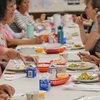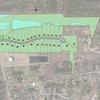VCSD students widen worldview
NEW SCOTLAND — Two Voorheesville students were part of an 18-member Model United Nations team that competed in Beijing, China recently, where they finished among the conference’s top delegations.
“You not only see people pretending to be from other countries coming together to solve real-world problems, you really have people coming together from all over the world to discuss real-world problems,” said Benjamin Denn, a junior at Voorheesville.
Denn and schoolmate Richard Decker Jr., a senior, made the trip together.
At the Model U.N. conference, each student is assigned a country from the 193 member nations and given a post to serve in the U.N. Students must follow established procedure and advocate for their assigned country through peer debate, based on the real-life United Nations.
Though Decker and Denn are members of Voorheesville’s Model U.N. team, they attended the Beijing competition after applying and being selected by the College Apprentice program.
In January, Denn and Decker attended a convention at Yale University with the Voorheesville team, where they performed well and were asked to consider applying for the company-sponsored regional team.
The two joined an all-star team of high school students from the northeastern United States and attended the 2013 WE Model UN, (WEMUN) Exposition, from July 31 to Aug. 4, in Beijing. About 35 teams, made up of 950 students altogether, competed in the event.
Decker was assigned to represent Japan in the United Nations Development Program and Denn represented Kuwait in the World Health Organization.
Students are scored for how well they represent their roles, which require researching the challenges facing those nations and how to address them through the U.N. Many of the actions and debates echo those of real life.
Solving problems
Similar to a school’s mock-trial competition, the exact topics and information to arise during a Model U.N. debate can be unexpected, requiring students to think fast on their feet and recall a diverse range of facts about their countries.
On the team, Decker was recognized as the “best delegate,” for his overall performance during the debates. Denn was honored for researching and writing the “best position paper,” among his team’s submitted essays. Among the competing delegations, Denn and Decker’s team won “best delegation,” for accumulating the highest score.
“I had the position of Kuwait. You usually have two topics; the first was climate change and its impacts on human health. The second was the health conditions in Gaza,” said Denn.
He explained that Kuwait, a small Middle Eastern country on the Persian Gulf, was suffering negative effects from rising sea levels, making the issue and consequences of global warming a serious political concern.
As another part of his argument, Denn also wanted the U.N. to approve the construction of a new water-treatment plant in Gaza to relieve the rampant water shortages its inhabitants endure.
“I wanted to build a water-treatment plant on the Mediterranean Sea; the idea is for it to be self-sufficient in creating clean water for Gaza,” he said.
The two topics Decker had to address for Japan were poverty in the Middle East and child soldiers in Africa.
“One of the big issues in the Middle East is gender equality. This is an actual issue in the U.N. now — without women in the work force they lose half their possible income,” said Decker.
He argued in support of work by non-government organizations, such as Habitat for Humanity, to create work programs in some countries, with an emphasis on hiring and training woman for agricultural related jobs.
Since many Middle Eastern countries, such as Yemen and Afghanistan, also struggle with a shortage of traditional crops, the resolution addressed two issues.
Many farmers in those regions prefer growing more lucrative crops — even illegal ones such as poppy, which is used to make opium, explained Denn.
In helping to rescue and prevent child soldiers, Decker again endorsed the work of charities to provide rehab and shelters to rescued child soldiers.
Decker admitted the limited power of charities in areas where child soldiers are used and said a successful program may need to chip away at the problem for a decade before substantial progress is made. He noted a student representing Israel was skeptical of not-for-profits having a large impact, and argued against his plan.
Thanks, Mom
After being selected for the all-star team, students are responsible for raising $6,000 each to pay travel expenses for the trip.
“I must have written 50 letters to local businesses, and I made a lot of phone calls, even had a bake sale for five days at Commerce Plaza in Albany. I’d get there at 8 a.m. and left at 6 p.m.,” said Denn, “Sold it all. It was all homemade… so I should mention, my mom worked really hard for me.”
One business even donated a 42-inch TV, which Denn raffled off.
The Voorheesville Community and School Foundation recognized the students at a dinner and donated $500 to Denn. Both students also thanked their Voorheesville Model U.N. advisor, David Lawrence, for writing them recommendations.
Seeing similarities
After arriving in Beijing, the team had three days of sight seeing before the competition.
The team visited the Great Wall, the Forbidden Palace, Tiananmen Square, and The Summer Palace, and mingled with street merchants.
“It was unbelievable. It was a great experience — three days touring. It was really easy at home to see all our differences but, when you were there, you see just how similar we are,” said Decker of China.
“When we got back to the States, we were joking about the communist government and everything. People have this mentality that, because it’s a communism, it’s bad,” said Decker. “There was a language barrier and personal space doesn’t really exist, but they’re people just like us; it doesn’t matter they’re in a communist country.”
Though Denn saw some similarities, he also saw the differences.
“I felt lucky to be an American. After seeing how people live in Beijing, and the freedom we have that they don’t, we take it for granted,” said Denn.
Before arriving in China, the students were told not to discuss certain topics in public.
“Facebook and Twitter and the Internet is blocked in China. That was tough at times. Our advisor told us not to talk about any hot topics, like recent Chinese police crackdowns or anything about Tiananmen,” recalled Denn, concluding, “It was definitely a learning experience.”

